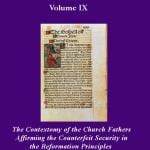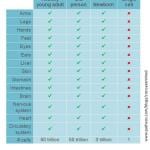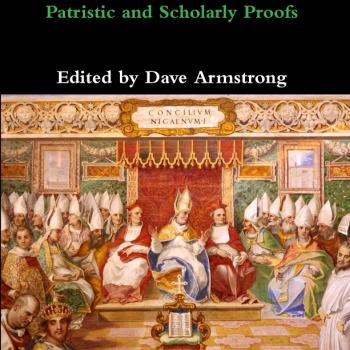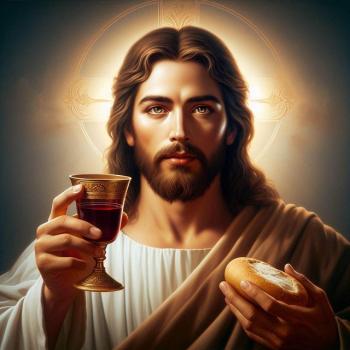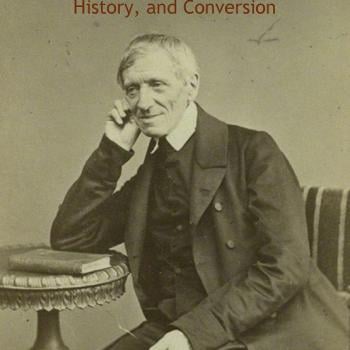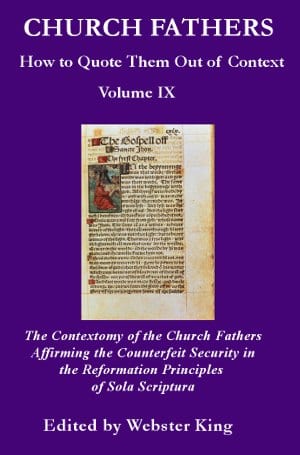
Protestant anti-Catholic polemicists David T. King and William Webster are the editors of a three-volume series, entitled, Holy Scripture: The Ground and Pillar of Our Faith (self-published by Webster’s outfit, Christian Resources Inc. [Battle Ground, Washington] in 2001). I’m most interested in Volume III: subtitled, “The Writings of the Church Fathers Affirming the Reformation Principle of Sola Scriptura” (edited by both Webster and King). In the Introduction to Vol. III (p. 9) they make the fantastically absurd, demonstrably false assertion:
[T]he Church fathers . . . universally taught sola Scriptura in the fullest sense of the term embracing both the material and formal sufficiency of Scripture.
The definition of sola Scriptura, according to three of the most able and articulate Protestant defenders of it in our time, is the following:
[T]he Bible alone is the infallible written authority for faith and morals (Norman Geisler)
Scripture . . . is the only inspired and inherently infallible norm, and therefore Scripture is the only final authoritative norm. (Keith A. Mathison)
The doctrine of sola scriptura . . . is that the Scriptures alone are sufficient to function as the regula fidei, the infallible rule of faith for the Church. (James R. White) [my bolding; see the sources for these quotations and also a fuller explication by each man]
Such a definition entails also understanding what sola Scriptura is not. It logically rules out tradition, the Church, ecumenical councils, bishops, popes, or appeal to apostolic succession as infallibly and finally authoritative. Only the Bible is that. Therefore, if any Church father believes that any of these are infallible or a final authority, then he (by the same token) does not and indeed cannot believe in sola Scriptura. I didn’t “set the rules”. Protestants have by defining sola Scriptura as they do. Thus, they have to live with their own definition and unbiblical rule of faith.
I shall be examining (in this series of papers) several Church fathers that Webster and King bring up, and documenting that they rejected sola Scriptura. I’ve already done this documentation with regard to Augustine, Athanasius, John Chrysostom, Jerome, Ambrose, Irenaeus, Justin Martyr, Clement of Alexandria, Hippolytus, Dionysius, Basil the Great, Cyril of Jerusalem, Theodoret, Gregory of Nyssa, Tertullian, Origen, Gregory Nazianzen, Epiphanius, Lactantius, Cyprian, Papias, Hilary of Poitiers, Cyril of Alexandria, Pope St. Gregory the Great, Rufinus, and John Damascene.
All citations are from Volume III unless otherwise indicated.
*****
And because nothing knows itself better than the very glory of God, we believe nothing on the subject of God with greater right than those writings in which God Himself is His own witness. (On the Incarnation of the Lord, Against Nestorius, Book 7, ch. 12) [p. 119]
[T]he mysteries of Scripture . . . were not declared to us by the grace of the Holy Spirit in order that they should remain unknown and obscure; but they are rendered obscure by our fault . . . the mere reading of Holy Scripture is by itself amply sufficient for beholding the true knowledge, nor do they need the aid of commentators . . . (Institutes of the Coenobia, 5:34) [p. 276]
***
The first citation has to do with material sufficiency: about which Catholics agree, so it is no proof of sola Scriptura. The second is about the perspicuity or clearness of Scripture, which is a different and more complex issue, but what he writes is not necessarily inconsistent with the Catholic rule of faith either. As always, to determine his view on the rule of faith, we need to see what any given Church father stated about other related issues, as outlined in the introduction above.
John Cassian (very much in contradiction to sola Scriptura) held that Church authority was infallible and able in and of itself to counter heretical beliefs:
Therefore, as I said above, if you had been a follower and assertor of Sabellianism or Arianism or any heresy you please, you might shelter yourself under the example of your parents, the teaching of your instructors, the company of those about you, the faith of your creed. I ask, O you heretic, nothing unfair, and nothing hard. As you have been brought up in the Catholic faith, do that which you would do for a wrong belief. Hold fast to the teaching of your parents. Hold fast the faith of the Church: hold fast the truth of the Creed: hold fast the salvation of baptism. (On the Incarnation of the Lord, Against Nestorius, Book 6, ch. 5)
He then must of course be outside the Church, who does not hold the faith of the Church. (On the Incarnation of the Lord, Against Nestorius, Book 3, ch. 14)
He believed in Petrine primacy:
. . . that greatest of disciples among disciples, and of teachers among teachers, who presided and ruled over the Roman Church, and held the chief place in the priesthood as he did in the faith. Tell us then, tell us, we pray, O Peter, you chief of Apostles, tell us how the Churches ought to believe in God. For it is right that you should teach us, as you were taught by the Lord, and that you should open to us the gate, of which you received the key. Shut out all those who try to overthrow the heavenly house: and those who are endeavouring to enter by secret holes and unlawful approaches: as it is clear that none can enter the gate of the kingdom save one to whom the key bestowed on the Churches is revealed by you. (On the Incarnation of the Lord, Against Nestorius, Book 3, ch. 12)
He taught that one had “faith in the Church”: the divinely instituted Body of Christ:
Because the flesh of the Church is the flesh of Christ, and in the flesh of Christ there is present God and the soul: and so the same person is present in Christ as in the Church, because the mystery which we believe in the flesh of Christ, is contained also by faith in the Church. (On the Incarnation of the Lord, Against Nestorius, Book 5, ch. 12)
John Cassian holds to apostolic tradition and succession and the “three-legged stool” Catholic rule of faith (Bible-Church-tradition):
If you were an assertor of the Arian or Sabellian heresy, and did not use your own creed, I would still confute you by the authority of the holy Scriptures; I would confute you by the words of the law itself; I would refute you by the truth of the Creed which has been approved throughout the whole world. I would say that, even if you were void of sense and understanding, yet still you ought at least to follow universal consent: and not to make more of the perverse view of a few wicked men than of the faith of all the Churches: which as it was established by Christ, and handed down by the apostles ought to be regarded as nothing but the voice of the authority of God, which is certainly in possession of the voice and mind of God. (On the Incarnation of the Lord, Against Nestorius, Book 6, ch. 5)
. . . an ever unbroken faith and Catholic confession . . . (On the Incarnation of the Lord, Against Nestorius, Book 7, ch. 30)
All of the above data, which is perfectly relevant to the question of John Cassian’s rule of faith, Webster and King deliberately decided to hide from their readers. This is atrocious research method and dishonest. They are too informed to simply plead the excuse of ignorance (not given the massive number of citations they have produced in three volumes). No; this is intentional misleading and disinformation.
***
Summary: John Cassian denied sola Scriptura, and espoused infallible Church authority, apostolic tradition and succession, and the “three-legged stool” Catholic rule of faith (Bible-Church-tradition).


